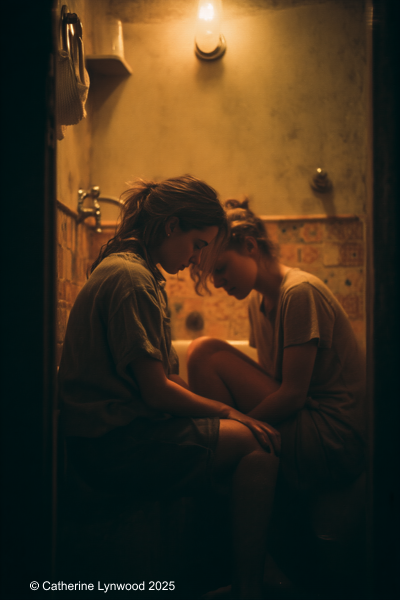Washing Away the Blood: Writing Violence, Survival, and Care
Why The Alpha Flame doesn’t flinch from brutality, but also refuses to forget compassion.



Washing Away the Blood: Writing Violence, Survival, and Care
I want to talk about something that’s come up in some of the hardest conversations I’ve had about this book. A few friends who are survivors of domestic violence read early sections or heard me describe certain scenes, and they were honest enough to say: “I’m worried this will hurt to read. That it’ll bring bad memories back.” And they’re right, it might. That was a moment that made me pause and think very carefully about what I was doing.
The Alpha Flame doesn’t flinch from showing violence. There’s a chapter in particular, a meal gone wrong, when Rick turns on Beth and Maggie, that is raw, threatening, humiliating, and physically brutal. I didn’t soften it. I didn’t make it “tasteful” or easy. Because the truth is, real violence isn’t clean or cinematic. It’s frightening. It changes you. It stays with you.
But I also didn’t want to write misery for its own sake. Because even in the worst moments, there can be care. Survival is ugly, but it also means you’re alive to feel what comes after. That was something I thought about constantly when writing that chapter, and especially what follows it.
The Aftermath Matters
There’s a moment in the aftermath that I knew had to be there. After the blood, the terror, the fight to get free, there’s a scene where Mary bathes them both. She washes away the blood and sweat and fear. And in that moment, these two hurt, angry, desperate women are reduced to what they really are: two girls. Vulnerable, young, in need of comfort. Their adult clothes lie in tatters, but in the bath, they’re stripped back to the truth of their pain and the possibility of healing.
That scene was just as important to me as the violence itself. Because survival isn’t just the fight, it’s what happens after. It’s the trembling, the tears you didn’t have time for before. It’s someone taking your bloodstained hands and saying: you’re still here. You still matter.
Writing it was hard. I wanted readers to feel the raw fear and danger, but I also wanted them to see the stubborn care that follows. I wanted them to see that survival is more than staying alive, it’s letting yourself be cleaned, held, seen.
Telling It Honestly
For those who worry this book might hurt to read: I understand. It might. I don’t offer an easy experience, because these topics don’t deserve to be easy. But I promise I wrote every violent moment with care, with respect for the people who have lived it. I never wanted to exploit pain for thrills. I wanted to tell the truth about what people can do to each other, and what it takes to come back from it.
That’s why Mary’s bath scene is there. Not to erase what happened, but to witness it. To give the girls, and the reader, a moment of humanity, even after horror. Because if there’s hope in The Alpha Flame, it’s not in avoiding pain, it’s in surviving it, together.